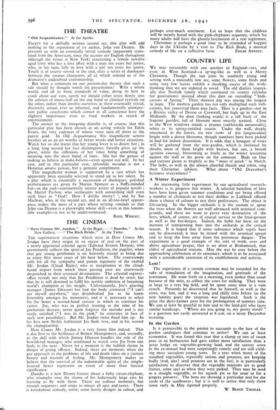THE THEATRE
" Old Acquaintance." At the Apollo.
EXCEPT for a skilfully written second act, this play will add nothing to the reputation of its author, John van Druten. He presents us with an essentially trivial comedy (apparently trans- lated from the American, since the accents are English throughout although the venue is New York) concerning a female novelist aged forty who has a love affair with a man ten years her junior, who, in his turn, falls in love with a girl ten years his junior. Youth is of course served in the end, after a series of duologues between the various characters, all of which remind us of the dramatist's undoubted craftsmanship.
But what a comment on our present-day theatre that such a tale should be thought worth the presentation! With a whole world, and all its basic standards of value, doing its best to crash about our ears, surely we should either retire firmly into the arbours of music-hall on the one hand or classical revivals on the other, rather than involve ourselves in these essentially trivial, discreetly sexual, ever so informal, and fundamentally unimpor- tant public catechisms which cannot in all conscience have the slightest importance even to tired workers in search of entertainment.
The answer to the foregoing diatribe is, of course, that this particular play has been chosen as an acting vehicle for Edith Evans, the very cadences of whose voice turn all dross to the purest gold. In Old Acquaintance this magnificent actress lavishes on us an art worthy of better words and better situations. Watch her as she learns that her young lover is to desert her ; in a long, long second her face disintegrates, literally gives up the ghost, while the inflexions of her voice bring something of meaning into the most banal of lines. She has the genius of making us believe in make-believe—even against our will. In her case, and in this particular case, splendide mendax is not a Horatian arriere pensee, but a genuine compliment.
This magnificent woman is supported by a cast which has apparently been specially selected to stand up to her talent. In a play which is essentially a succession of duologues, polished performances are given by Marian Spencer as a fluffy-minded but—in the end—sentimentally sincere writer of popular novels ; by Muriel Pavlow, who surmounts with astonishing skill even such lines as " God! How I dislike sherry! '; and by Ian Maclean, who, in the second act, and in an all-too-brief appear- ance, makes the most of a part whose writing reminds us that John van Druten is a playwright whose skill—even in this lament-
able example—is not to be under-estimated. BASIL WRIGHT.






















 Previous page
Previous page